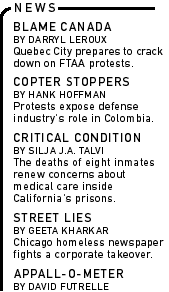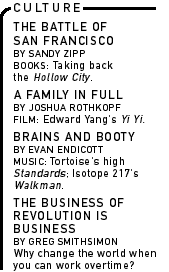

|

|

|

|
| |
 |
|
|
On February 27, George W. Bush made his first speech before Congress and presented his priorities for the next four years--tax cut now, consequences later. The following day progressives gathered under the banner of the Campaign for America's Future to rage against the tax cut and sketch an alternative set of priorities (see "Setting the Agenda," page 3). Here's some of what was said--and what wasn't. Bush touted his tax cut as evidence of his policy of fairness. Progressives agree that there should be some sort of a tax cut, but point out that under the Bush plan the wealthiest 1 percent would get 43 percent of the benefits. Progressives also spoke of the need for new social investment. Bush also proposes to let every senior on Medicare "choose a health care plan that offers prescription drugs." Progressives fear that this is a move to privatize part of Medicare. They noted that we need a health care plan for uninsured children, and one way to get this would be to expand Medicare to provide those services. Bush said little about race and nothing about gender equality. Rep. Jesse Jackson Jr. (D-Illinois) lamented the failure of recent administrations to fight for fundamental rights, going so far as accusing the Clinton administration of "race entertainment." Heidi Hartmann, president of the Institute for Women's Policy Research, noted that while more women than ever are working, the male-female wage gap actually has increased in recent years. Bush failed to address last year's flawed presidential election. Rep. John Conyers (D-Michigan) spoke of the electoral abuses suffered by people of color throughout the country, not just in Florida. Reforms are needed now, he says, while the memories of last year's electoral outrages are still fresh. Nor did Bush mention campaign finance reform. But Ellen Miller of Public Campaign calmly detailed the obscene amounts of money that poured into the last election (for example, corporations outspent labor by a ratio of 15-to-1). Calling for publicly financed elections, she noted that passage of the McCain-Feingold would ban just 15 percent of the political money spent on the election. But the assembled progressives failed to include on their agenda a number of pressing issues. Although Bush proclaimed, "We can produce more energy at home while protecting our environment, and we must"--the progressives didn't touch on this. Do we really trust the Bush administration to develop a balanced energy policy? Neither Bush nor the speakers at the conference addressed the failed drug war. Why not? It's a classist and racist policy that hasn't stopped drug abuse, has wasted billions of tax dollars and threatens to involve us in a war in Colombia. Bush mentioned the environment briefly, but he did not address the question of how he plans to deal with global warming and the other major threats to the environment. At the conference, progressives had little to say about the environment other than noting the need for new cooperation between environmentalists and labor on "how to protect workers from the consequences of environmental policy." Bush spoke only in generalities about the military, but what he did say was disturbing. He indicated that the Defense Department is preparing a new military vision and consequently his budget "makes a down payment on the research and development that will be required," including development of the National Missile Defense system. What's not spelled out is the price tag for all this, or the impact these new weapons will have on our relationships with the European Union, Russia, China and the nuclear wannabes. Unfortunately, the progressives looking toward America's future had no response to these alarming proposals. No one asked, "Whatever happened to the idea of the peace dividend?" It seems like our work is cut out for us. As always, I look forward
to hearing from you at bburnett@inthesetimes.com.
|

